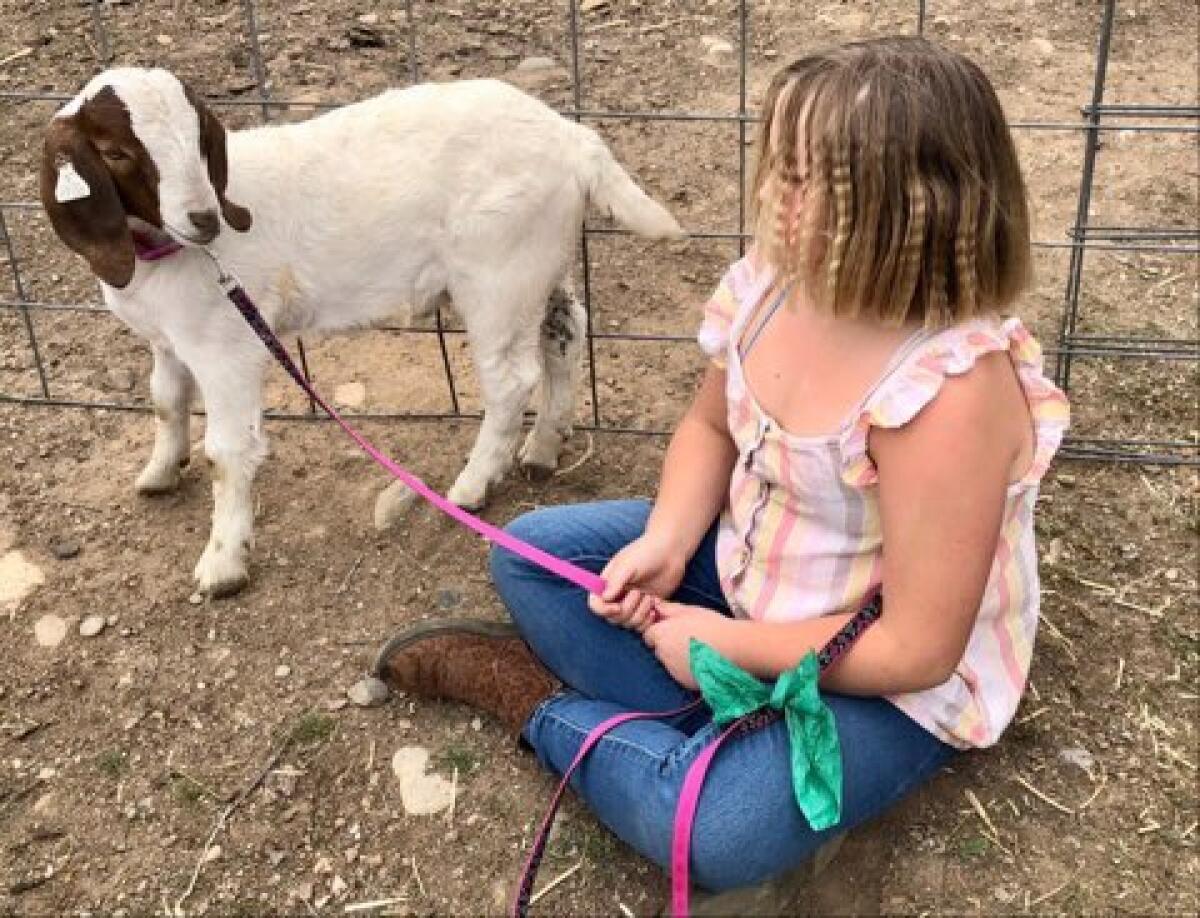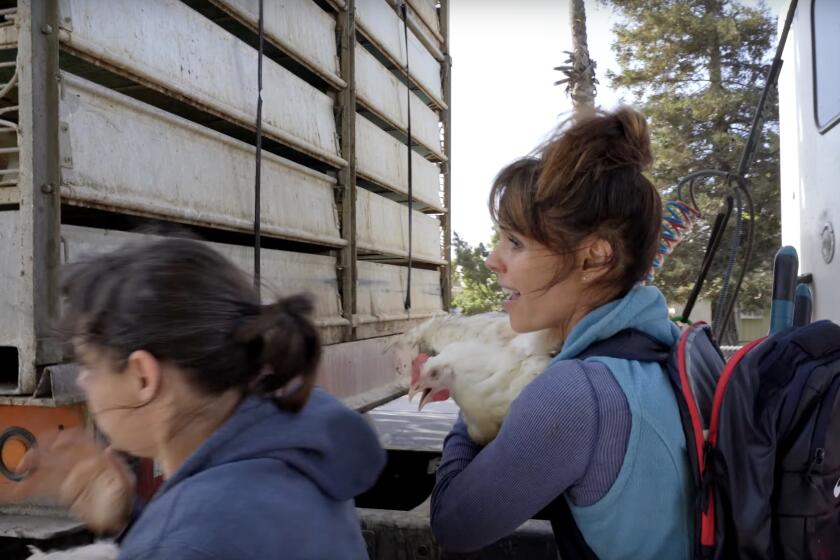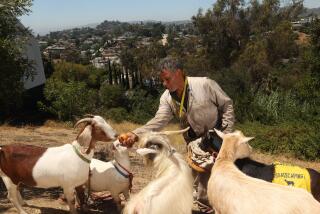A 9-year-old girl didnât want her goat slaughtered. California fair officials sent deputies after it

Every day for three months, Jessica Longâs young daughter walked and fed her goat, bonding with the brown and white floppy-eared animal named Cedar. But when it was time for Cedar to be sold and slaughtered at the Shasta District Fair last year, the 9-year-old just couldnât go through with it.
âMy daughter sobbed in her pen with her goat,â Long wrote to the Shasta County fairâs manager on June 27. âThe barn was mostly empty and at the last minute I decided to break the rules and take the goat that night and deal with the consequences later.â
Long purchased the goat for her daughter to enter into the 4-H program with the Shasta District Fair. Children are taught how to care for farm animals. The animals are then entered in an auction to be sold and then slaughtered for meat in hopes of teaching children about the work and care needed to raise livestock and provide food, as farmers and ranchers do.
In her letter, Long pleaded for the fair to make an exception and let her and her daughter take Cedar back. Aware that Cedar had already been sold in auction, she also offered to âpay you back for the goat and any other expenses I caused,â according to the letter obtained by The Times.
Alexandra Paul and another activist took chickens from a truck outside of Foster Farmsâ Livingston, Calif., plant in what they called an âopen rescue.â
Instead, officials reached out to the Shasta County Sheriffâs Office. Armed with a search warrant, detectives drove more than 500 miles across Northern California in search of the goat.
According to the search warrant, deputies believed Cedar was staying at Bleating Hearts Farm and Sanctuary in Napa County, based on the fact that the sanctuary had posted on Instagram its support for Long and urging people to call the Shasta District Fair to convince them to spare Cedar. But Long had taken Cedar to a farm in Sonoma County because she and her family live in a residential area in Shasta County and are unable to keep farm animals there.
Echoing language used when law enforcement search a home for drugs, the warrant allowed deputies to âutilize breaching equipment to force open doorway(s), entry doors, exit doors, and locked containersâ and to search all rooms, garages and âstorage rooms, and outbuildings of any kind large enough to accommodate a small goat.â
Cedar was taken and slaughtered.
Long has since filed a federal lawsuit against Shasta District Fair officials and the county, arguing they committed an âegregious waste of police resourcesâ and violated her and her daughterâs 4th Amendment and 14th Amendment rights protecting them from unreasonable searches and seizures, and due process. Long and her attorneys allege the dispute was a civil matter she was willing to resolve.
Letters, text messages, a search warrant and other court documents reviewed by The Times show how a dispute over a 9-year-old girlâs pet goat quickly escalated, and that Shasta District Fair officials resorted to using police resources after noting that their handling of the dispute over Cedar had become âa negative experience for the fairgrounds as this has been all over Facebook and Instagram.â
âIt was never about money,â said Vanessa Shakib, an attorney for Advancing Law for Animals who represents Long. âCounty officials were clear that they wanted to teach this little girl a lesson.â
Shasta District Fair and county officials did not respond to requests for comment. The suit was first reported in the Sacramento Bee.
âThis matter is in active litigation, and as such neither the County nor its legal counsel can provide a comment,â Christopher Pisano, an attorney representing Shasta County, said in an email.
Shakib argues that county and fair officials abused their power in what should have been a simple breach of contract.
Attorneys for Long also argue the countyâs response to use law enforcement personnel and resources was disproportionate, considering they were dealing with a family who was trying to keep a goat from being slaughtered.
âItâs shocking,â said Ryan Gordon, an attorney with Advancing Law for Animals. âItâs a little girlâs goat, not Pablo Escobar.â
Gordon and Shakib argue that Long tried to resolve the issue from the outset, writing an email to fair officials the day after.
In it, Long pleaded her case, pointing out that the last year had been a particularly difficult one for her young daughter.
âOur daughter lost three grandparents within the last year, and our family has had so much heartbreak and sadness that I couldnât bear the thought of the following weeks of sadness after the slaughter of her first livestock animal,â she wrote to Shasta District Fair Chief Executive Melanie Silva.
But Shasta District Fair officials threatened to call police the next day and rebuffed Longâs attempt to find another outcome for Cedar other than it being returned, slaughtered and donated for a barbecue.
âMaking an exception for you will only teach [our] youth that they do not have to abide by the rules,â Silva wrote back to Long in an email reviewed by The Times dated June 28. âAlso, in this era of social media this has been a negative experience for the fairgrounds as this has been all over Facebook and Instagram.â
That same day, B.J. Macfarlane, livestock manager for the Shasta Fair Assn., sent Long a text message.
âWe need to make arrangements to get goat back today,â the text read. âIf not law enforcement is going to be brought in on this.â
Long also offered to repay the fair district and the bidder whatever costs had been incurred. That included the winning bid of $902 made by state Sen. Brian Dahle (R-Bieber) and the 7% cut that the fair was entitled to of $63.14.
A recent study found that drought and heat waves could worsen air pollution for California communities already dealing with environmental injustices.
In her June 27, letter to Silva, Long also pointed out that she had already been in contact with Dahleâs office about his bid, and that a representative told her the lawmaker was âokay with the alternative solution of the goat getting to be donated to a farm that does weed abatement.â
A spokesperson for Dahleâs office confirmed the account.
Gordon and Shakib also argue that although fair officials were trying to hold Longâs daughter to her agreement that the goat would be slaughtered when entered into the fair, California law allows a minor to withdraw from a contract âwithin a reasonable amount of time.â
âA child canât be held to the same standard as an adult can,â Gordon said. âWhen she wanted out, she had an absolute right.â
The county was also legally required to keep and care for Cedar, Gordon argues, knowing there was a dispute over ownership. Instead a third party slaughtered him when he was returned by deputies.
Attorneys argue the county used the warrant âfor the sole purpose of circumventing the civil processâ and killed the goat as a way to end Long and her daughterâs fight for Cedar.
âThe government was seeking to silence our clients viewpoint,â Shakib said. âOur lawsuit seeks to hold public officials accountable for violating the law and enacting a personal vendetta against a little girl simply because she loved her goat.â
More to Read
Sign up for Essential California
The most important California stories and recommendations in your inbox every morning.
You may occasionally receive promotional content from the Los Angeles Times.













